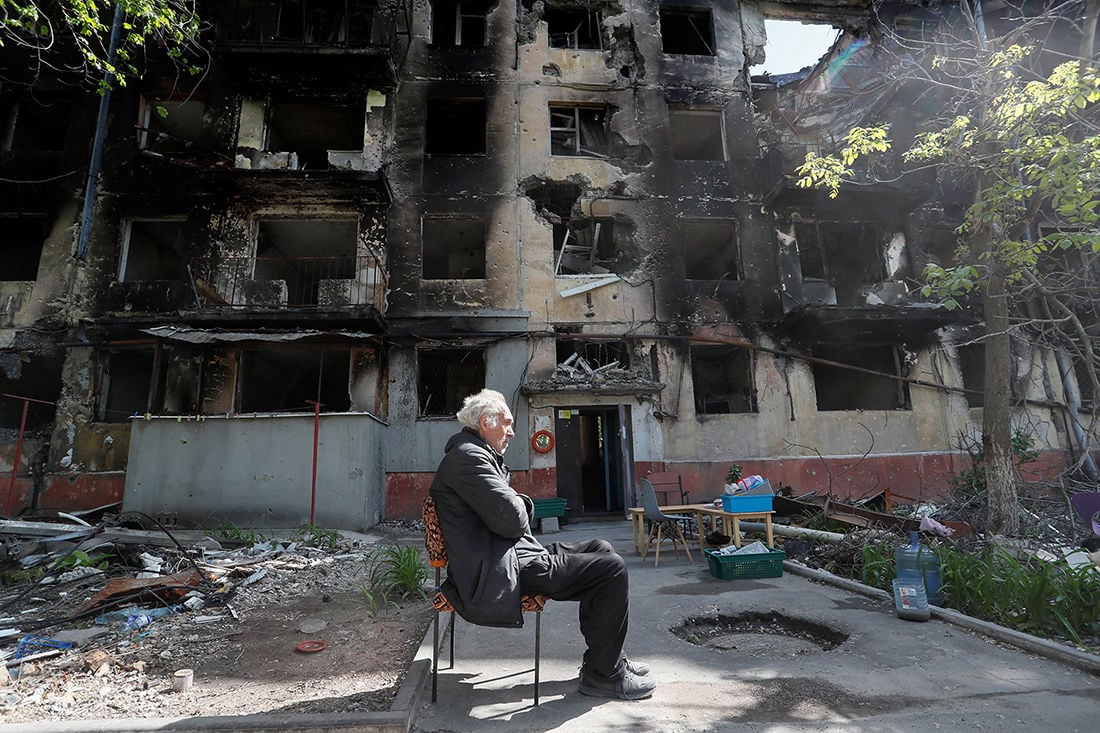In Mariupol, fish out of hand can cost lives: infectious disease spreads through the city
23 April 16:11
Cases of botulism have been reported in Mariupol. This was reported by "Komersant Ukrainian" with reference to a post on the Telegram channel of the Mariupol City Council.
The reason is the consumption of fish purchased from unauthorized outlets and spontaneous markets.
Citizens are warned that products that have not undergone sanitary control and are sold without proper documents can pose a serious health risk.
However, no one in Mariupol deals with these issues. Spontaneous markets and unauthorized trade are flourishing in the temporarily occupied city. In addition, no one checks the quality of products and compliance with sanitary standards. Constant water cutoffs and poor quality of water complicate compliance. Therefore, the Russian occupiers shift their responsibility to the people themselves.

Why was there an outbreak of botulism in occupied Mariupol?
In general, the situation with water, sanitation and hygiene in occupied Mariupol remains critical and has continued to deteriorate since the city was seized by Russian forces in 2022. According to Human Rights Watch, residents have been living in a humanitarian catastrophe for months after active hostilities, with no access to electricity, water, or qualified medical care. These problems have not yet been resolved.
The destroyed water supply and sewerage systems have not been restored to the proper level, and in some areas are completely absent. People are forced to use water from open sources, including contaminated wells, ponds, and even puddles. This approach sharply increases the risk of contracting dangerous infections, including cholera, dysentery, hepatitis A, and other waterborne diseases.
The sanitary condition of the city also raises serious concerns. Due to the large-scale destruction of infrastructure and the lack of organized removal of garbage and bodies, there may still be decomposing human and animal remains under the rubble. This creates a favorable environment for the growth of pathogenic bacteria and insect vectors such as flies and rats. The smell of decomposition, unsanitary conditions, and the lack of a proper waste disposal system all lead to a constant threat of disease outbreaks among the local population.
An additional risk factor is the limited access to personal hygiene products: soap, detergents, disinfectants and even toilet paper have become scarce. In such conditions, the spread of skin diseases, pediculosis, fungal infections and scabies is significantly increasing. The problems are exacerbated in vulnerable groups: the elderly, children and people with chronic diseases.
The temporary shelters and shelters in which many citizens live after the destruction of their homes are also not adapted to basic sanitary standards. People sleep on the bare floor or on temporary bunks, without ventilation, with limited access to clean water and toilets. These conditions are especially dangerous during the spring and summer warming period, when the likelihood of epidemics increases.
Medical care remains virtually inaccessible. Most hospitals and outpatient clinics have been damaged or destroyed, and those that remain are either operating at minimum capacity or serve primarily the military. Residents report a shortage of medicines, doctors, and means to disinfect wounds and treat basic infections. Even if they have symptoms of poisoning or infection, many people are unable to get qualified help in a timely manner.
In fact, Mariupol is currently in a state of steady sanitary collapse. The return of basic living conditions – clean water, accessible healthcare and hygienic safety – is only possible if the infrastructure is fully restored and international humanitarian organizations are allowed to assess and address the situation on the ground. In the meantime, the city’s population is left face to face with a growing sanitary disaster, the consequences of which could be large-scale and long-term.
What you need to know about botulism
Botulism is an infectious disease caused by the neurotoxin of the bacterium Clostridium botulinum. It lives in an anaerobic environment (without access to oxygen). It releases one of the strongest toxins in nature – botulinum toxin.
Foodborne botulism is the most common: due to the consumption of improperly preserved food (home-made meat or vegetable preserves, dried or smoked fish, sausage).
Wound botulism – when the toxin is produced in the wound (a very rare form).
Infantile botulism – in infants, if the bacterial spores enter the intestines (often through honey).
Intoxication botulism – due to inhalation or intravenous injection of the toxin (very rare, mostly during botulinum therapy in uncontrolled conditions).
Symptoms usually appear 6-36 hours after poisoning.
The first ones are weakness, dizziness, dry mouth, visual impairment (double vision, “fog”). Then there is paralysis of the muscles of the face, larynx, and respiration.
Possible respiratory failure is the main cause of death in botulism.
What to do if you suspect botulism
- Seek medical attention immediately.
- Do not self-medicate.
- Do not throw away suspicious food (it can be tested in the laboratory).
In the hospital, a person is injected with an antibotulinum serum that neutralizes the toxin (effective only until paralysis develops).

How to prevent botulism?
- Do not eat home-canned food if it has mold or a suspicious odor.
- Store food at the right temperature conditions.
- Do not buy dried fish and meat by hand or at spontaneous markets.
- Never give honey to children under 1 year of age.
It should be noted that dozens of cases are recorded in Ukraine every year, mostly due to home preserves and fish. Without treatment, the mortality rate can reach 70%; with treatment, the mortality rate does not exceed 10%.
Читайте нас у Telegram: головні новини коротко









